HOSTED BY: 1 AIR TRAVEL
Editor’s note: TPG purchased a round-trip fare in economy for $2,597 USD and accepted a complementary upgrade to business class for access to the cabin. At the time of booking, business class on this route was blocked for purchase by the airline and was reserved for dignitaries and media. Several remaining business class seats were released for sale by the airline shortly before the flight.
Seventeen hours is a long time to spend on an airplane. But is getting a journey over with in one 17-hour stint better than taking two shorter, but still-grueling flights broken up by a transfer on the ground?
It really comes down to personal preference. For the majority of customers, Air New Zealand thinks the answer to that is “yes,” embracing a trend that the airline industry at large seems to have embraced for long international travel.
The airline launched its inaugural nonstop service between Auckland (AKL) and New York’s John F. Kennedy International Airport (JFK) this weekend, offering Kiwis and New Yorkers alike the chance to skip what some would view as a miserable stop at a hub like Los Angeles or Houston, instead allowing them to stay asleep — or at least in that air travel-induced fugue state — without interruption.
Want more airline-specific news? Sign up for TPG’s free biweekly Aviation newsletter.
The concept is nothing new, but market conditions and aircraft technology had previously limited the economic viability and simple mechanics of these ultra-long flights.
Air New Zealand’s ambitions aren’t new, either; the airline announced a route from Auckland to Newark (EWR) in 2019, scheduled to begin in October 2020, before shelving those plans due to the pandemic. Nor are they unique: a flagship nonstop service between the East Coast and the Oceania region that includes both Australia and New Zealand has been on at least one other airline’s radar.
It’s a race that Air New Zealand has won, with the New York flight coming at least three years before Qantas says it plans to launch nonstop flights from Sydney to New York and London, which would become the two first-longest flights in the world, respectively (Singapore Airlines currently holds both titles).
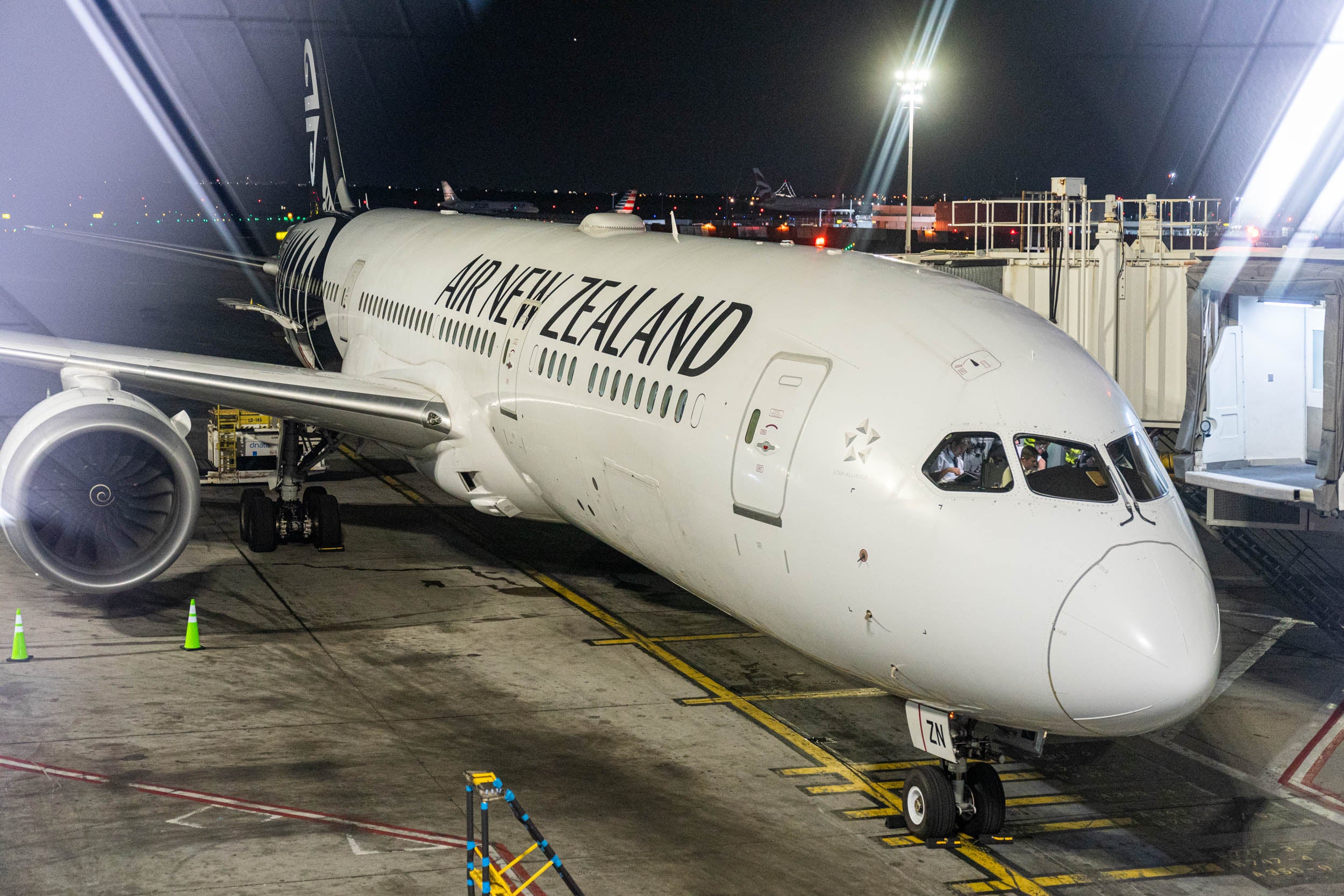
DAVID SLOTNICK/THE POINTS GUY
In 2019, Qantas operated two proof-of-concept flights to Sydney — one each from New York and London — using newly delivered aircraft. The flights were mostly empty, aside from a contingent of airline staff and media, and were criticized by some as being little more than a stunt, since there was no concrete plan to actually launch the flights.
Nevertheless, the Australian carrier used the flights to test a few interesting concepts and gather data for regulators. Two current TPG staffers were aboard the New York flight, myself included. It was indeed a long flight, but Qantas tried several service strategies for the all-day flight, which had a nighttime 9 p.m. departure in New York time.
Among those, it shifted the flight to Sydney time immediately on departure. That meant that instead of serving a meal shortly after takeoff like normal, passengers were encouraged to eat before the flight and only light snacks were served at first, since it was 11 a.m. in Sydney. Dinner wasn’t served for a few hours, and passengers were encouraged to stay awake. The idea was that it would help with jetlag.
Air New Zealand, however, dispensed with that on its inaugural from New York, offering dinner service shortly after the nighttime departure. Breakfast was served shortly before the early morning arrival at Auckland.
Was one time-zone approach better than the other? It’s hard to say, but as I write this in my Auckland hotel on Monday afternoon after an hour-long nap and a shower, it’s hard to say that I feel any better or worse than I did on the Project Sunrise test flight. I’m a bit out of it but, awake and focused as usual — presumably, my editor will let me know if this article was littered with jetlag-induced typos when I file it. (It was not, he says.) Still, we’ll see how I feel later tonight and over the next few days.
Air New Zealand’s service is open for booking and is now flying as part of the carrier’s regular schedule. There was pre-launch marketing hype in the New York market, but — beyond that — there was not much of the pomp, circumstance and shtick that accompanied the Project Sunrise flights. Still, the flight has drawn interest across the industry for its status as yet another super-long flight — and because it gives flyers the chance to get the 8,800-mile flight across 16 time zones done in one shot rather than breaking it up with a connection and a longer overall travel time.
big deal…though you might not know itThis is a major flagship route for Air New Zealand, supporting the tourism industry and offering a faster mode of travel for business travelers, ex-pats, and people heading on vacation.
Although there were festivities in Auckland as the first New York-bound flight departed, things at JFK were quieter for the first Auckland-bound segment.
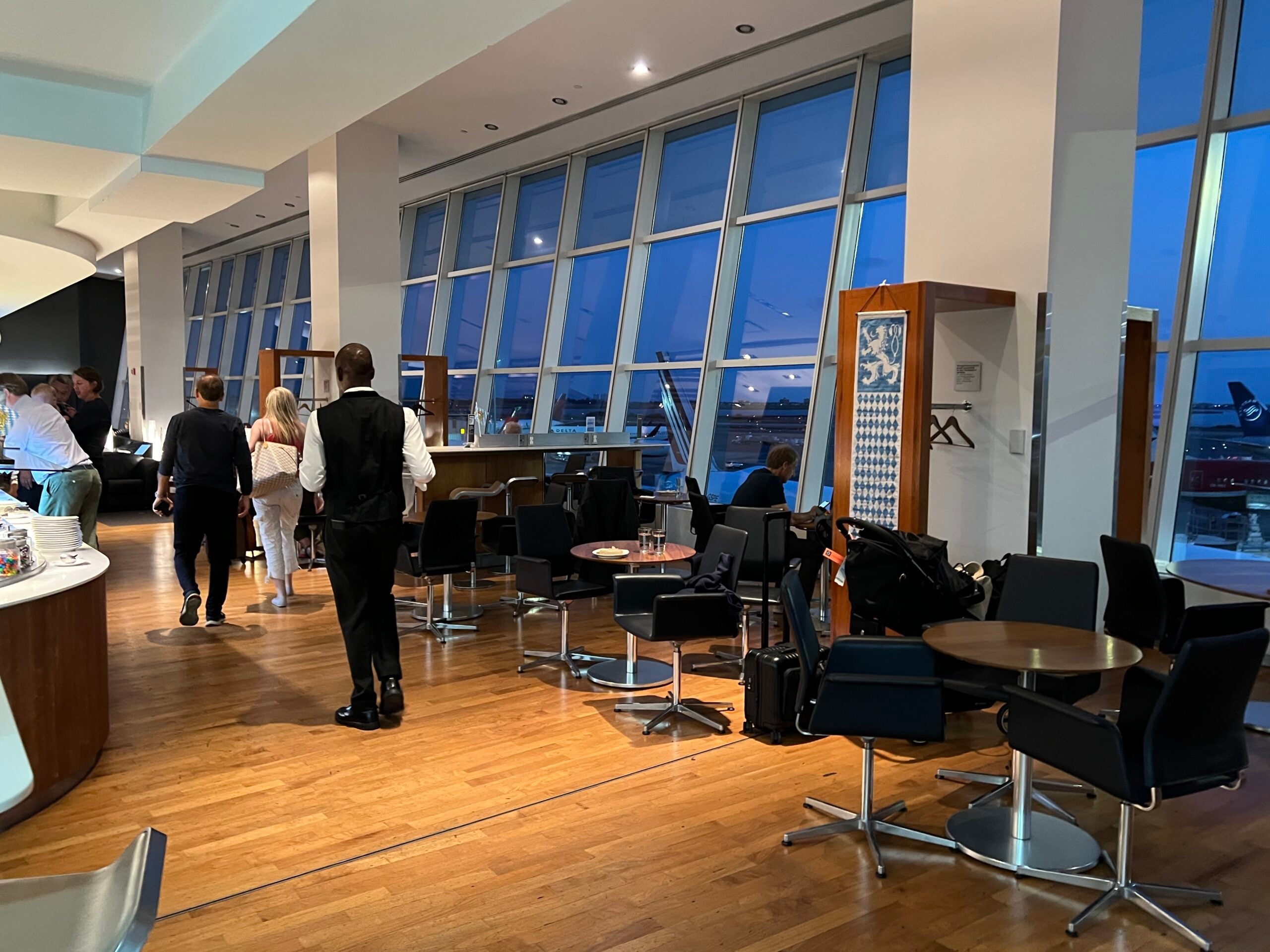
DAVID SLOTNICK/THE POINTS GUY
Air New Zealand uses the Lufthansa lounge at JFK’s Terminal 1 for now. After scanning my boarding pass, I was directed to the upper floor with several other passengers on the flight. The lounge is busy, serving all Star Alliance partners out of Terminal 1 — the Turkish lounge is currently closed, leaving Lufthansa as the remaining option for those flights. Still, there was a decent selection of hot and cold food, along with soft drinks and wine apparently available upon request.
Typically, inaugural flights see loud, gaudy festivities at the gate before departing. But that put Air New Zealand in a somewhat strange position.
While the airline’s hub is in Auckland, the return segment of the New York flight is arguably the one that draws the highest profile for the airline. In fact, it’s the returning flight, from JFK, that bears the flight number NZ1 — the northbound flight to New York is NZ2.
The new flight is expected to bring $65 million annually into New Zealand’s economy, airline CEO Greg Foran told the New Zealand Herald.
The U.S. market is important to New Zealand, and a nonstop from New York is expected to increase the country’s appeal as it reopens to tourists. Prior to the pandemic, the U.S. was the third-biggest tourism market for New Zealand (behind Australia and China), comprising 10% of all visitors and 13% of all visitor spend, according to Tourism New Zealand.
Nevertheless, Auckland is the hub, and the initial departing flight bound for New York saw big celebrations.
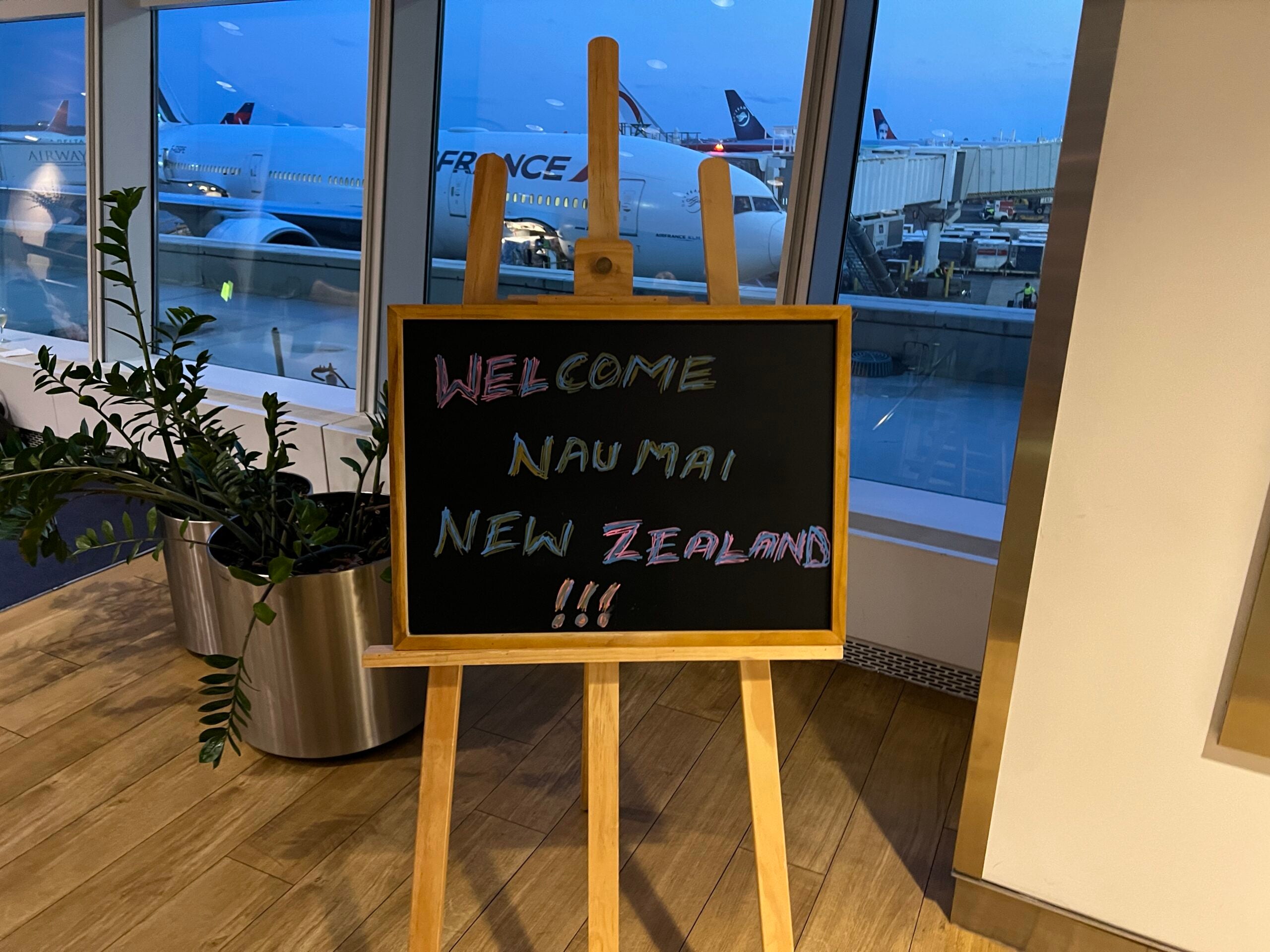
DAVID SLOTNICK/THE POINTS GUY
On the New York side, there was little evident to suggest that this flight was anything special, aside from a sign in the Lufthansa lounge welcoming Air New Zealand passengers for the first time.
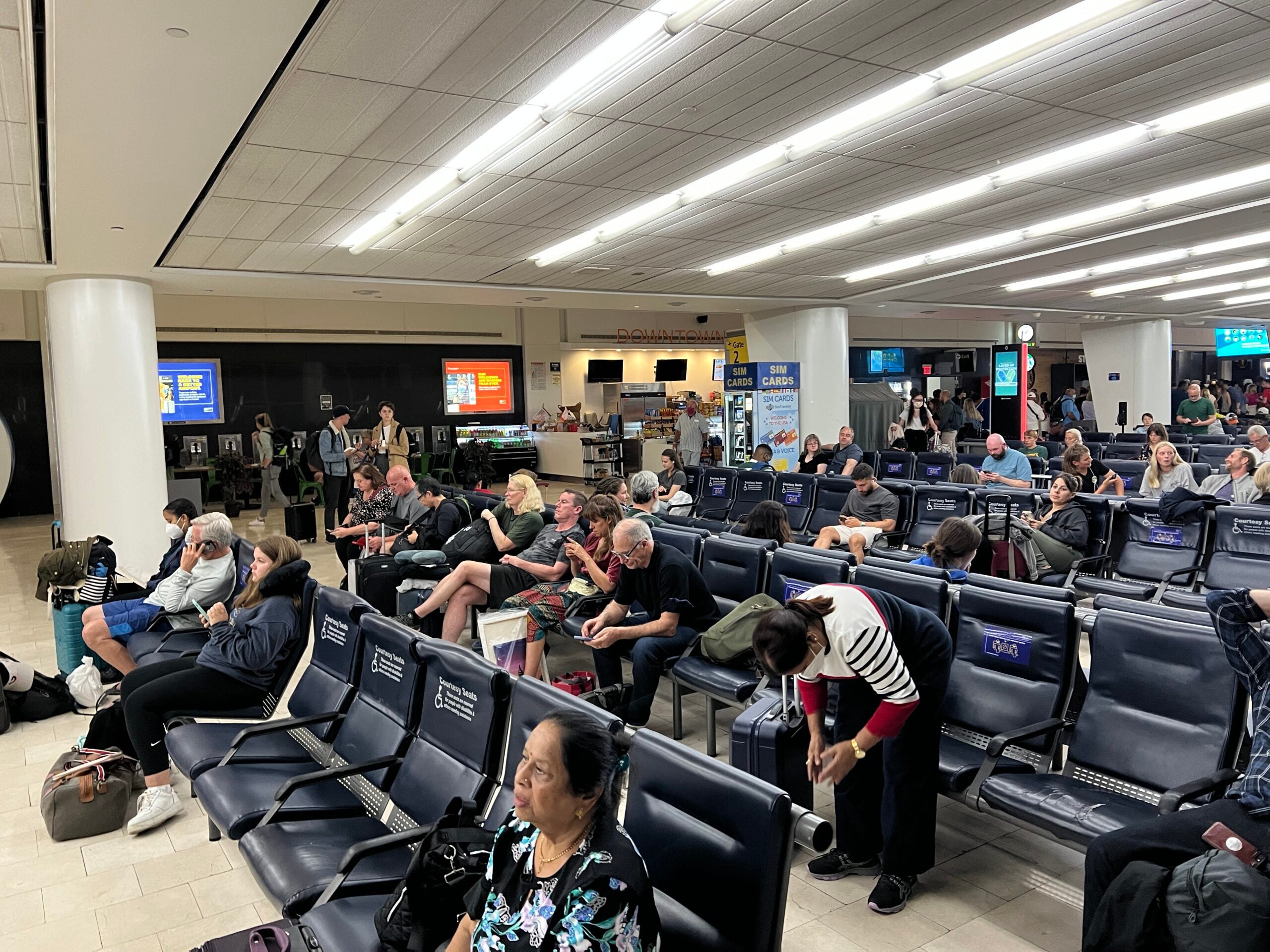
DAVID SLOTNICK/THE POINTS GUY
At the gate itself in Terminal 1, which is notoriously crowded during the night departure bank, things were more routine. A spokesperson for the airline said that logistics at the airport Saturday night made a gate event unfeasible.
It stood out as a stark contrast to events at other inaugural flights, which tend to bemuse passengers who booked the flight without realizing there was anything special about it.
In this case, however, it seemed clear that passengers realized that the route was new, even if some of them may not have known they were aboard the actual first flight.
“I’m so glad there’s finally a direct,” one Kiwi passenger said in the lounge before the flight
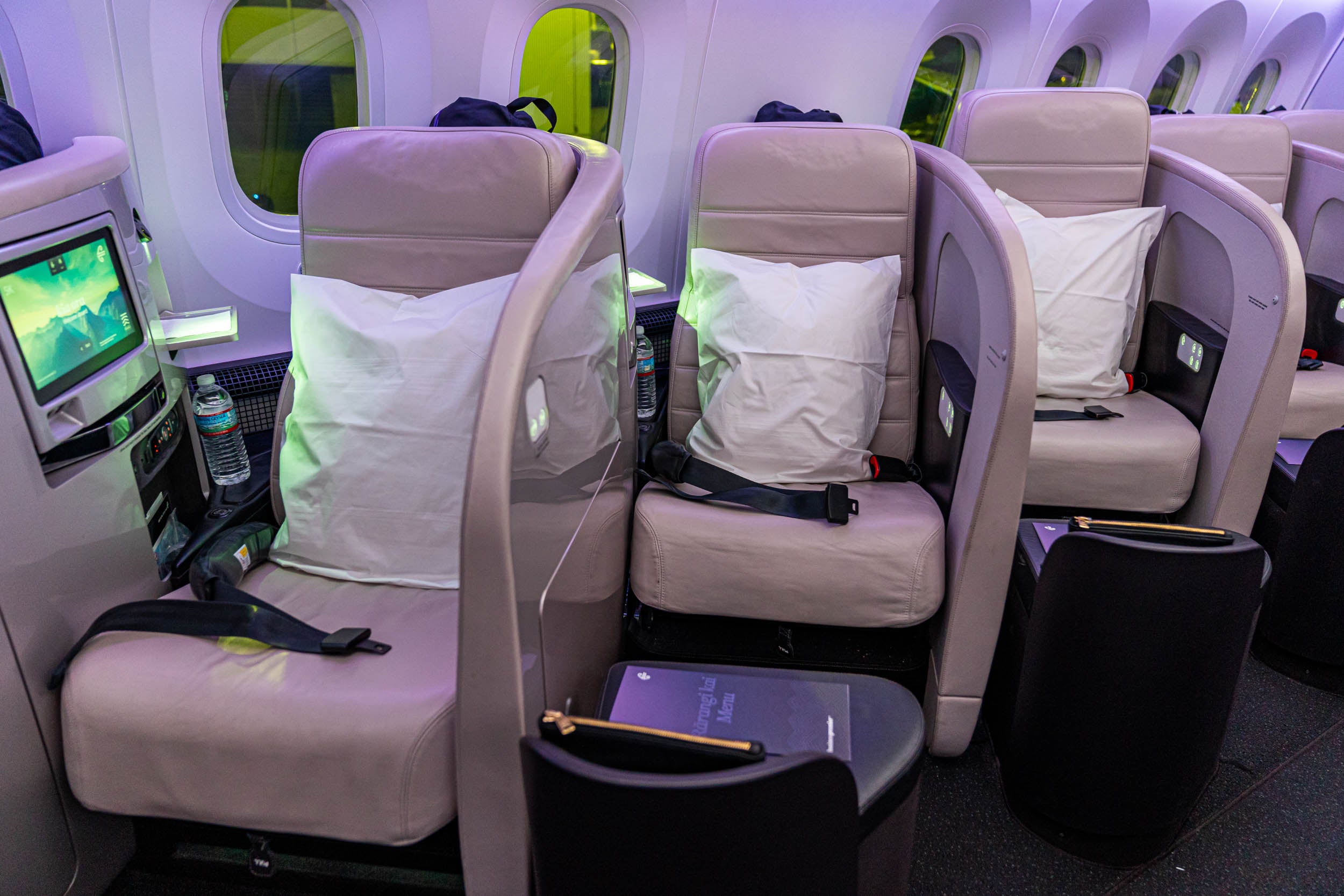
DAVID SLOTNICK/THE POINTS GUY
About an hour before the flight was scheduled to depart, there was already a decent crowd in the seats at the gate. I boarded the plane early to get photos, chatted with a few flight attendants, and settled into my seat, 5K.
The plane boarded, the pilots made the usual pre-flight announcements, and then we sat. And sat, and sat. The captain came on to let us know that our flight was having trouble getting a tug assigned to push us back from the gate. Classic JFK during the busy night banks, as all the international flights try to depart nearly at once.
About an hour later, we departed.
Business Casual Cabin ExperienceInaugural flights are always a bit weird because there are, well, people like me on board. It’s not a typical flight — there’s often some amount of festivities on board, whether it’s airline staff passing out souvenirs, executives greeting passengers and the usual photo ops from those trying to document the experience.
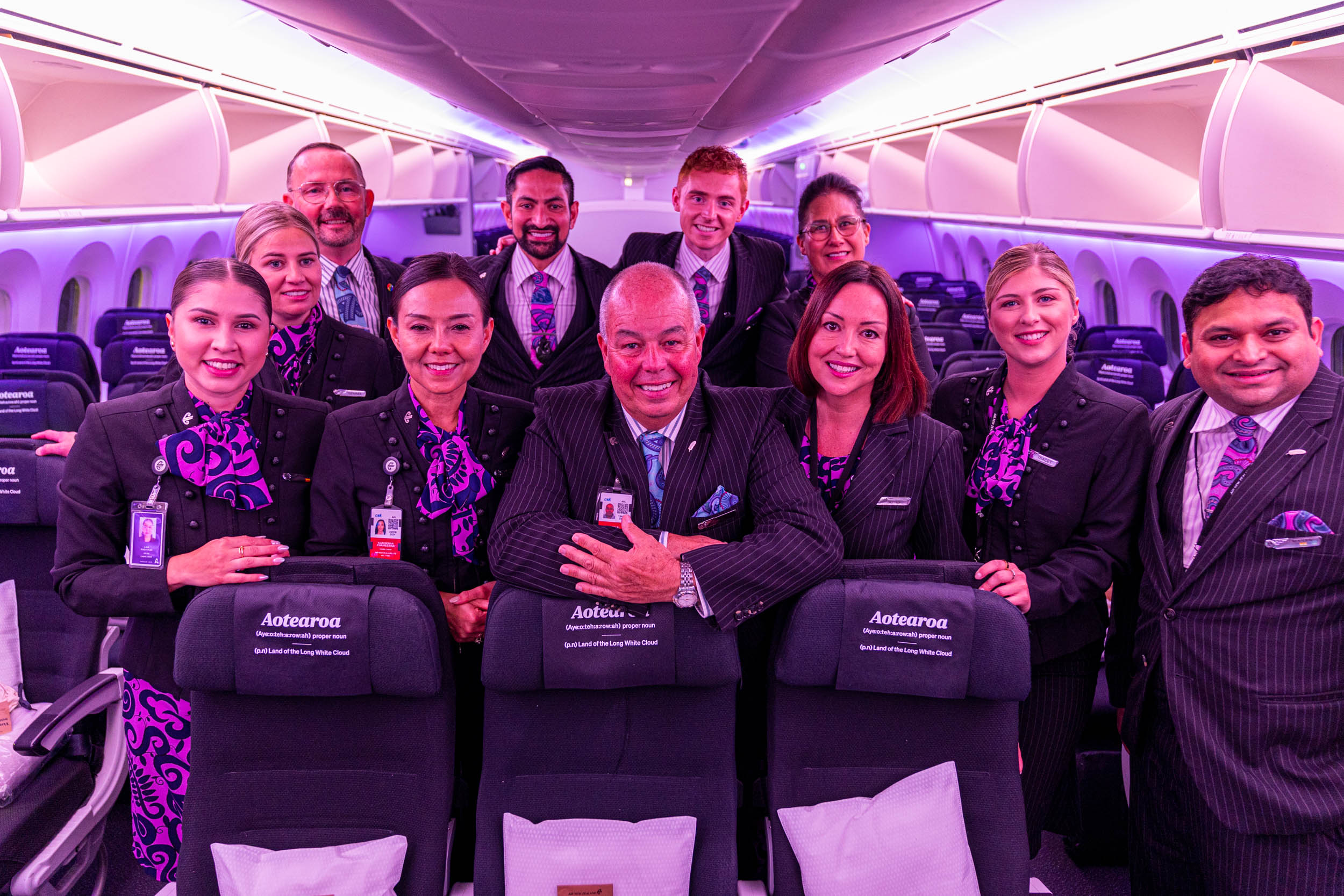
DAVID SLOTNICK/THE POINTS GUY
Despite the lack of gate celebration, the experience on board was celebratory with announcements from both the captain and cabin manager, including a notice that there would be some photography on board and advising passengers to let a flight attendant know if they wanted to ensure they weren’t included in any photos.
In the business-class cabin, as passengers boarded and settled down, there was an unusually friendly and chatty atmosphere.
Part of that was driven by the fact that there were a handful of reporters and airline staff — myself included — who were sitting in the cabin.
But it was also driven by the rather obsolete cabin layout in business class.
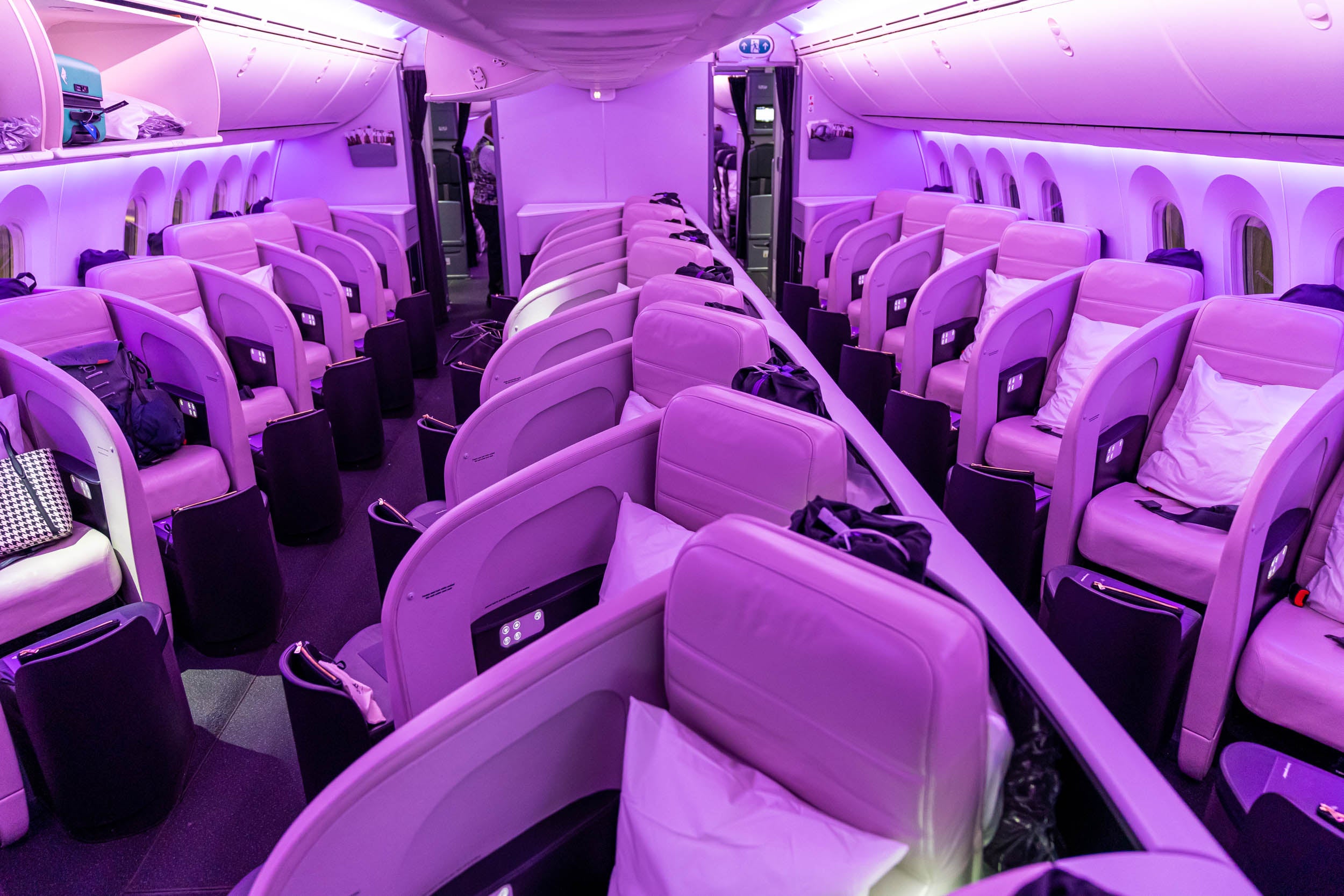
DAVID SLOTNICK/THE POINTS GUY
The trend in premium cabins these days is towards privacy and personal space. Whether it’s a new domestic first class product or the latest international business class, airlines are working with suppliers to build cabin products that offer, if not true privacy, then at least the illusion of it, where passengers can’t see each other’s faces.
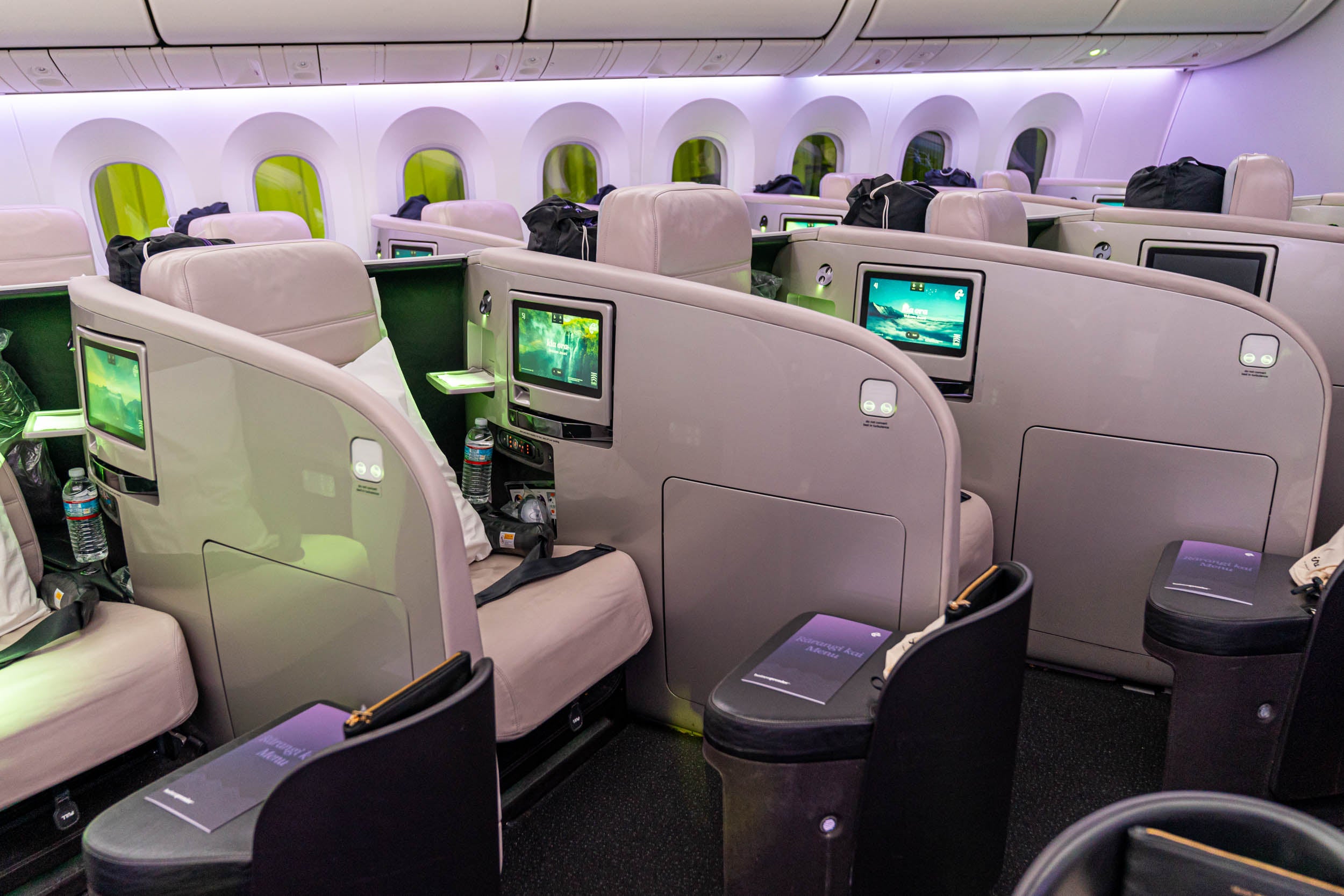
DAVID SLOTNICK/THE POINTS GUY
Air New Zealand has a product in the works that it plans to introduce in 2024 that fits this trend, but the current on-board product is the exact opposite. Passengers sit in a 1-1-1 configuration facing the aisle at what feels like about a 70-degree angle. There are walls between seats, but you can make eye contact and chat with the people sitting across from you and on either side. While I actually like the set-up when it’s time to sleep — more on that in a bit — it feels entirely open while seated.
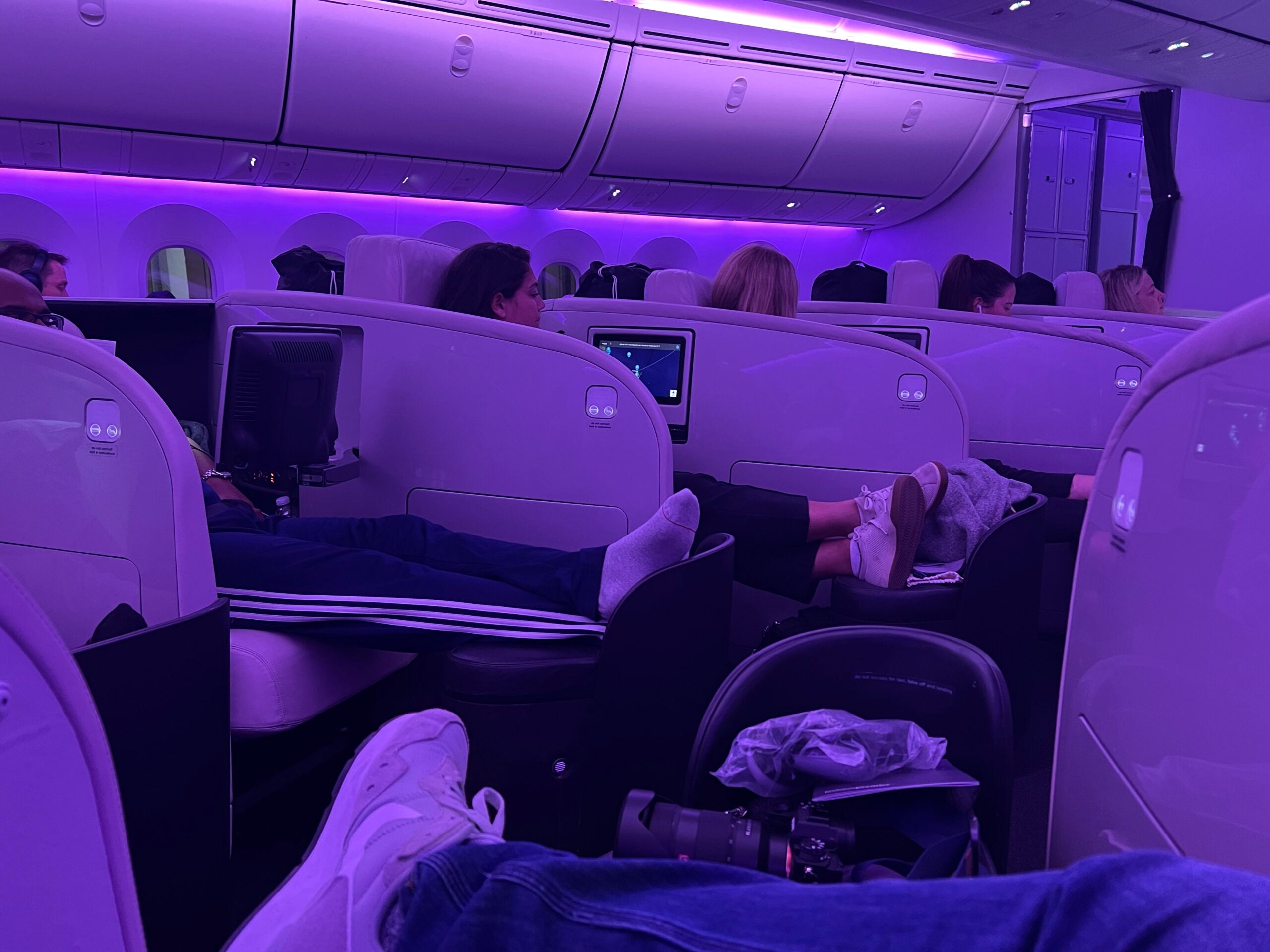
DAVID SLOTNICK/THE POINTS GUY
After boarding and even after takeoff, as those of us who knew each other chatted, other passengers joined in with opinions on the flight and thoughts about travel. For an inaugural, it was a friendly and social experience. But I imagine that isn’t what a typical flight is like, and I hope that passengers didn’t want to go right to sleep given the post-departure atmosphere in the cabin.
Settling in for the long-haul
Seventeen hours is a long time to spend on an airplane. But the good news is that it means there’s plenty of time to enjoy the full on-board service and still have time to sleep as much as possible, as opposed to those short overnight transatlantic flights where sometimes you have to choose between eating dinner or sleeping.
The dinner service on this flight was among the best I’ve had in business class, with a good and customizable selection, fresh produce and excellent flavors. So I’m doubly glad I had time to enjoy it without sacrificing sleep.
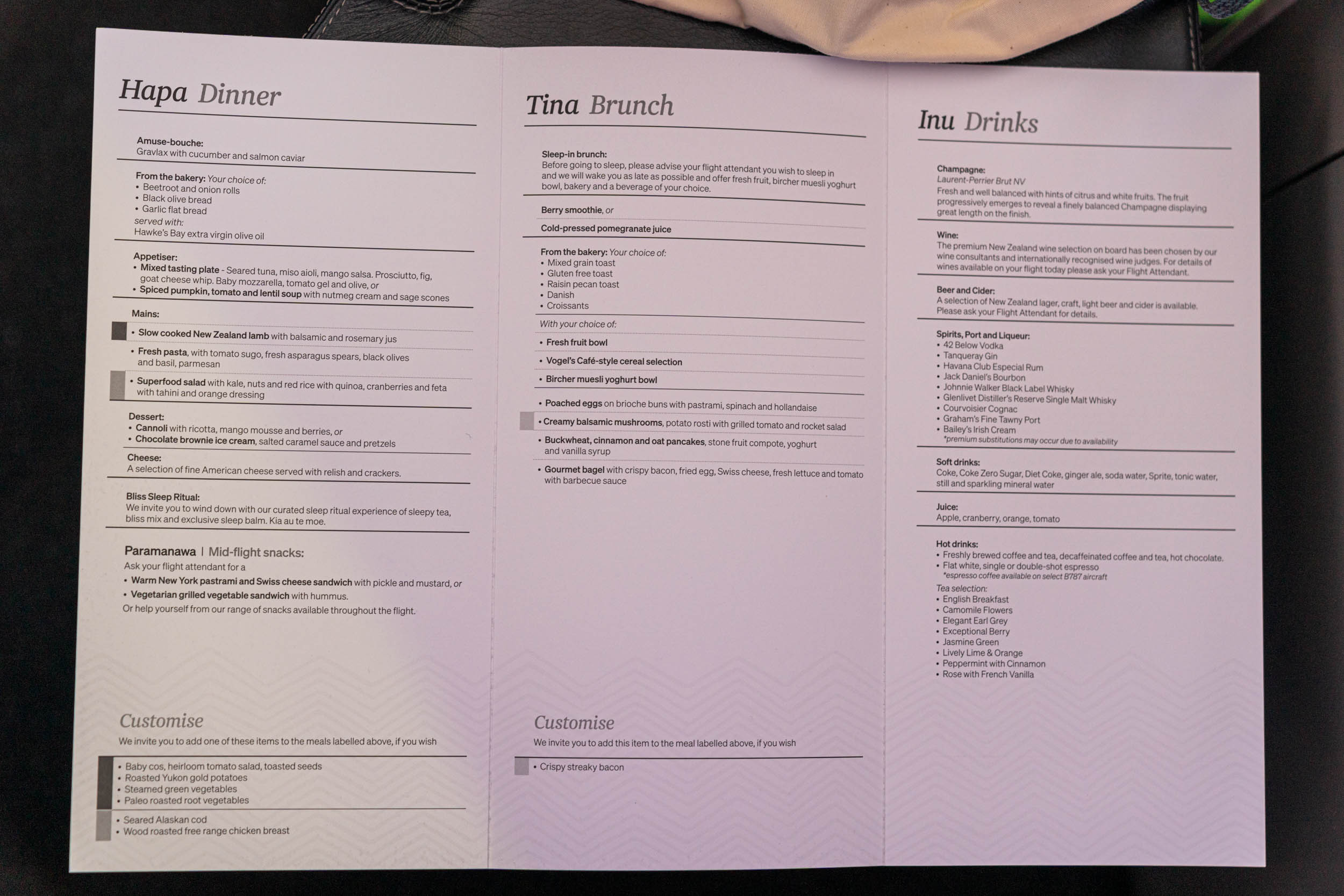
DAVID SLOTNICK/THE POINTS GUY
Also, since the Lord of the Rings trilogy is my favorite thing to watch during long flights, and we were headed to New Zealand, where the movies were famously filmed, I decided to watch the extended editions of the movies during the flight. See if you can spot which scene corresponds with which dinner course.
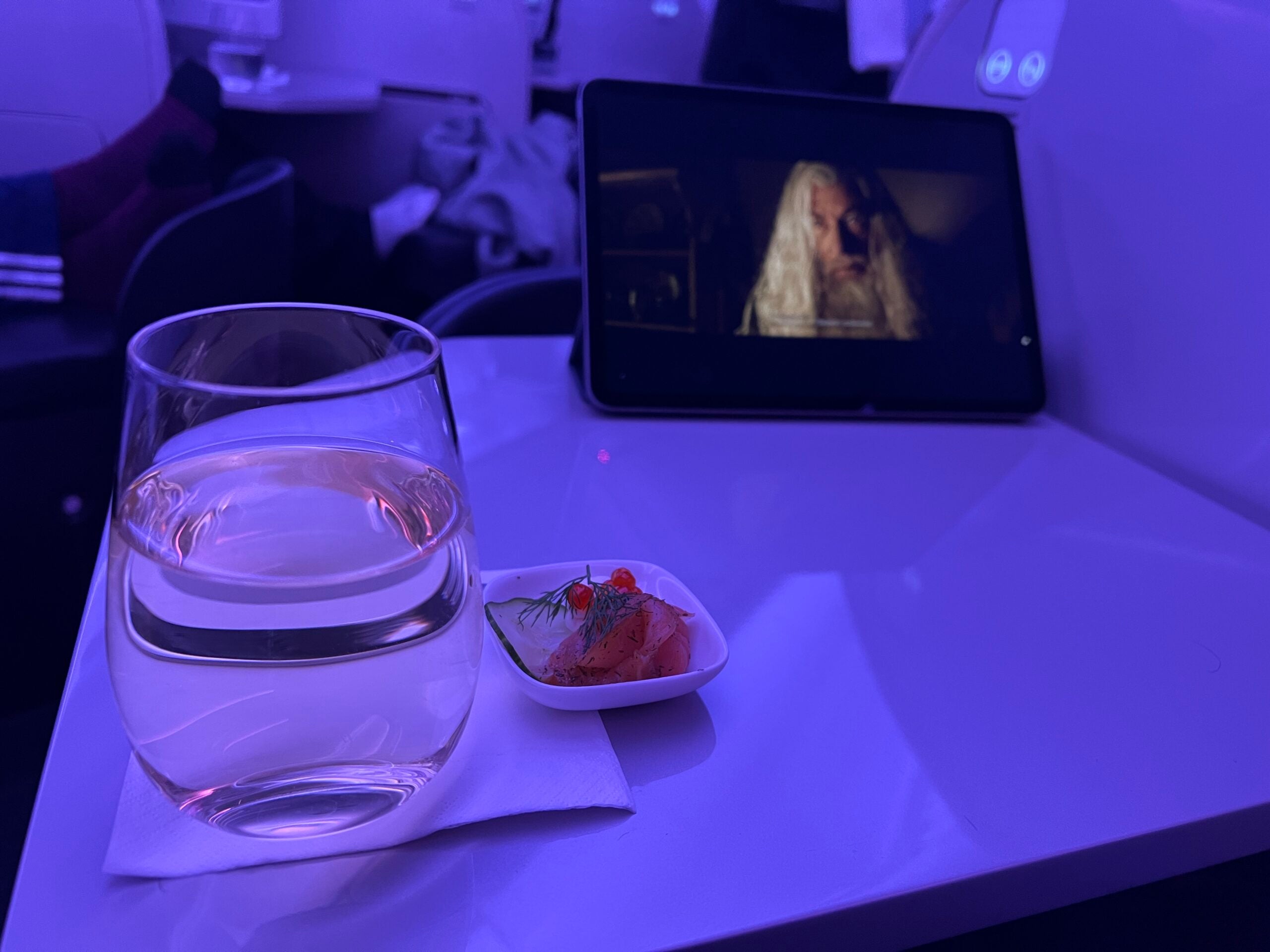
DAVID SLOTNICK/THE POINTS GUY
A first in-flight drink was brought by about 40 minutes after take-off — orders were taken on the ground — along with a delicious gravlax amuse-bouche.
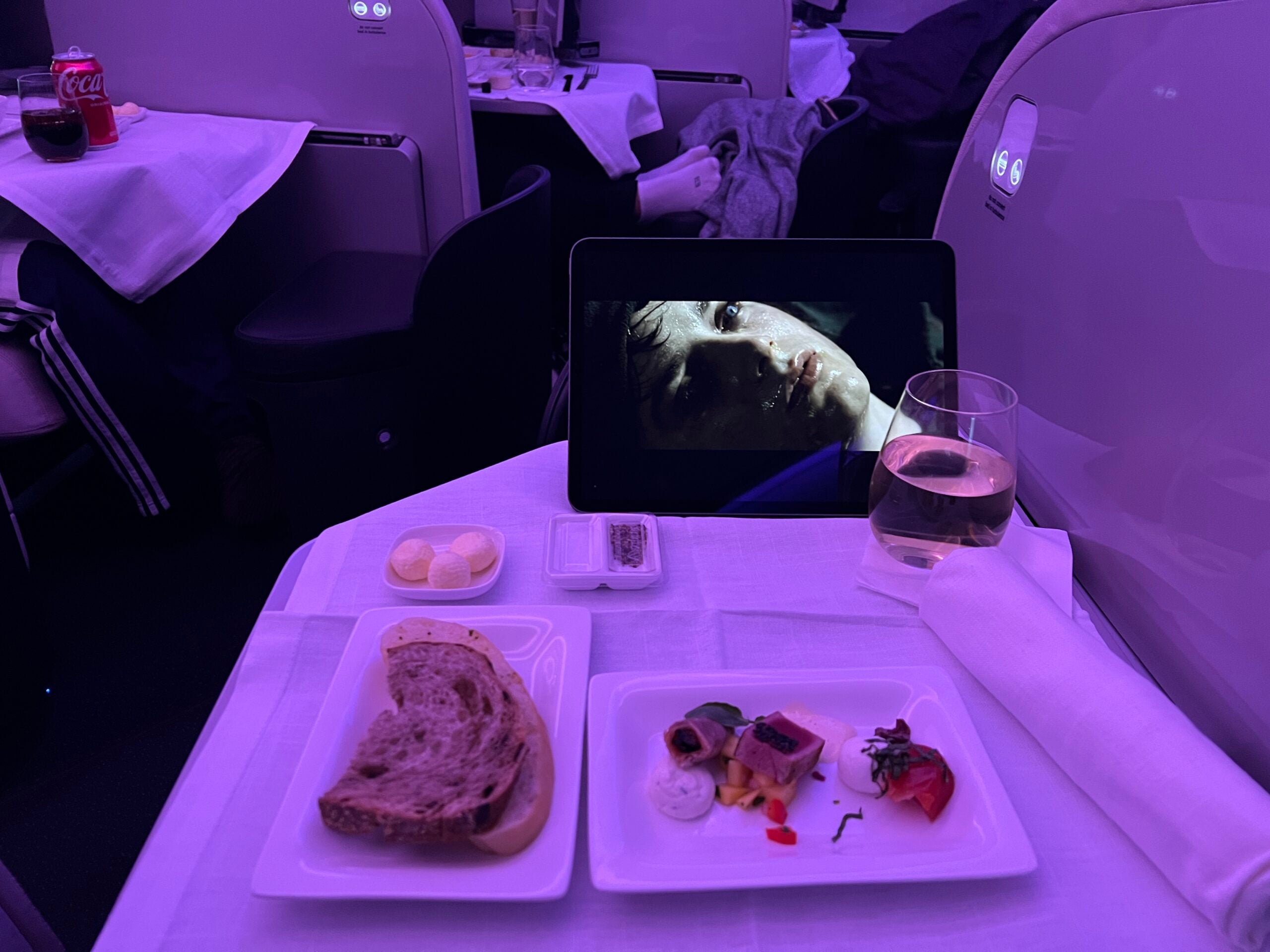
DAVID SLOTNICK/THE POINTS GUY
Bread service and the first course, along with a drink refill came about 30 minutes later. I went with the tasting plate.
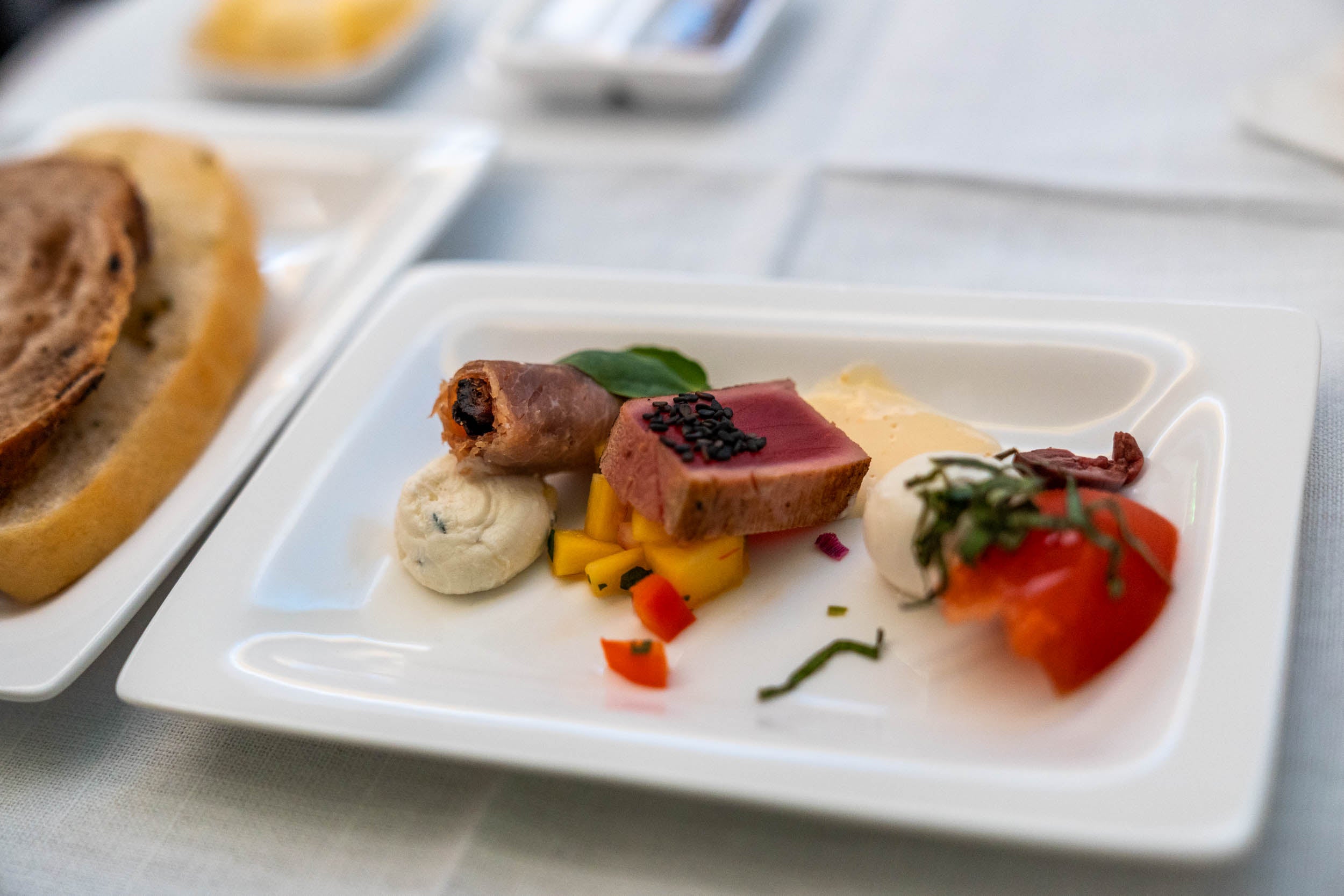
DAVID SLOTNICK/THE POINTS GUY
While everything on it was tasty, the seared tuna was delectable.
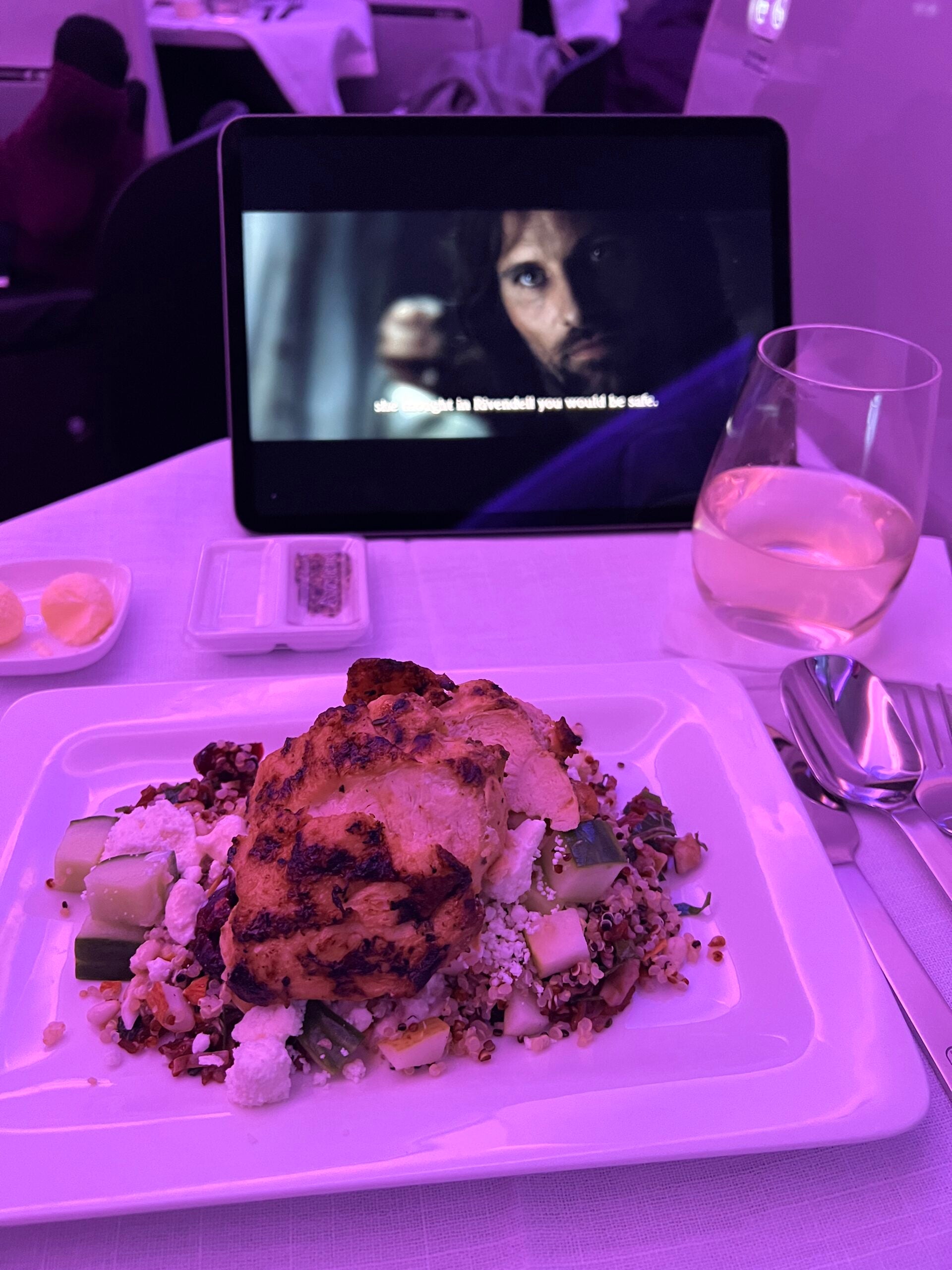
DAVID SLOTNICK/THE POINTS GUY
My main course came 30 minutes later. I went with the superfood salad. The airline offers a selection of sides and proteins with which passengers can customize their entrees — a unique feature worked out with caterer LSG, according to Louise Leaupepe, a program manager at the airline — so I opted to add chicken to my salad.
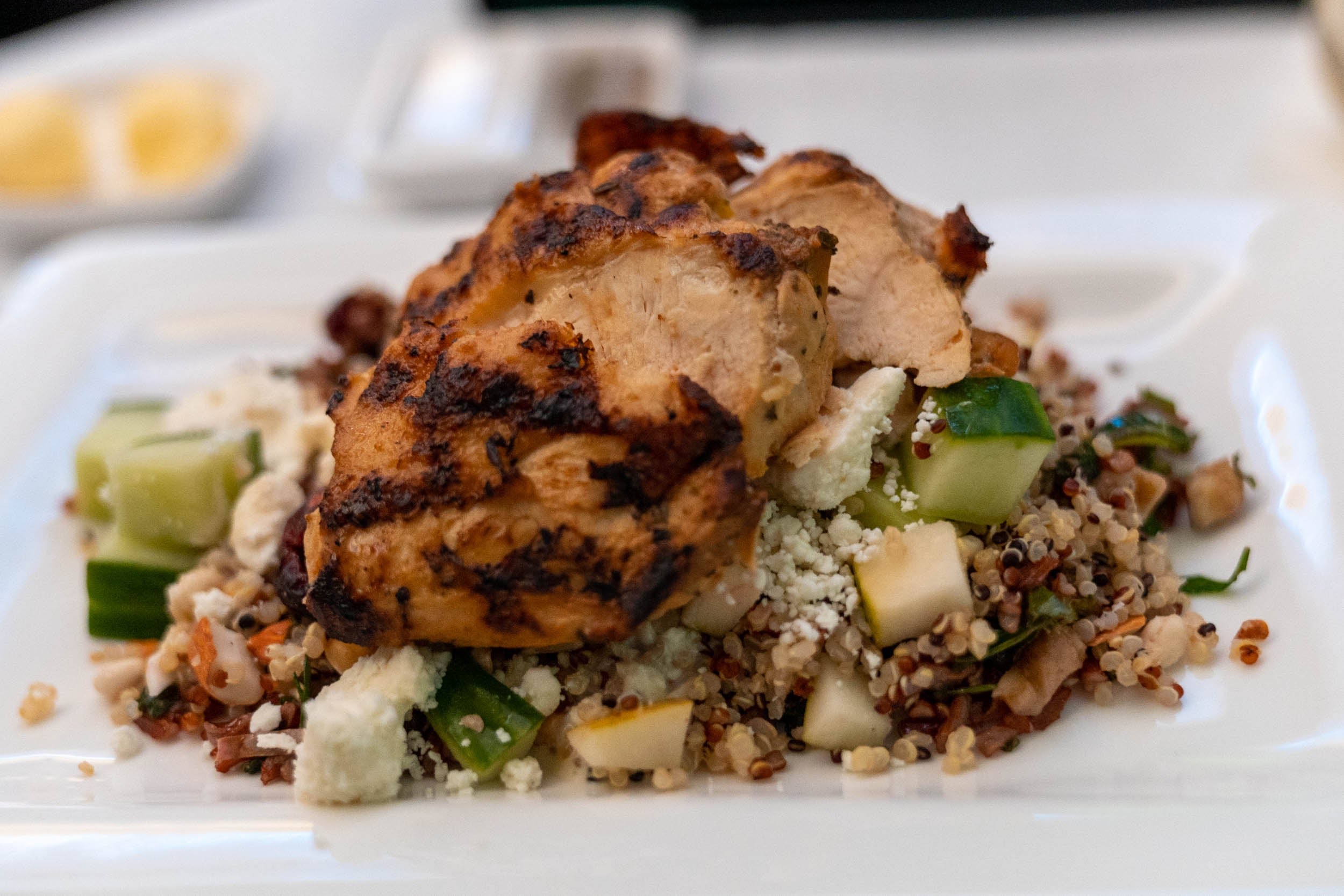
DAVID SLOTNICK/THE POINTS GUY
The chicken was flavorful and juicy, while the salad was fresh and tasty.
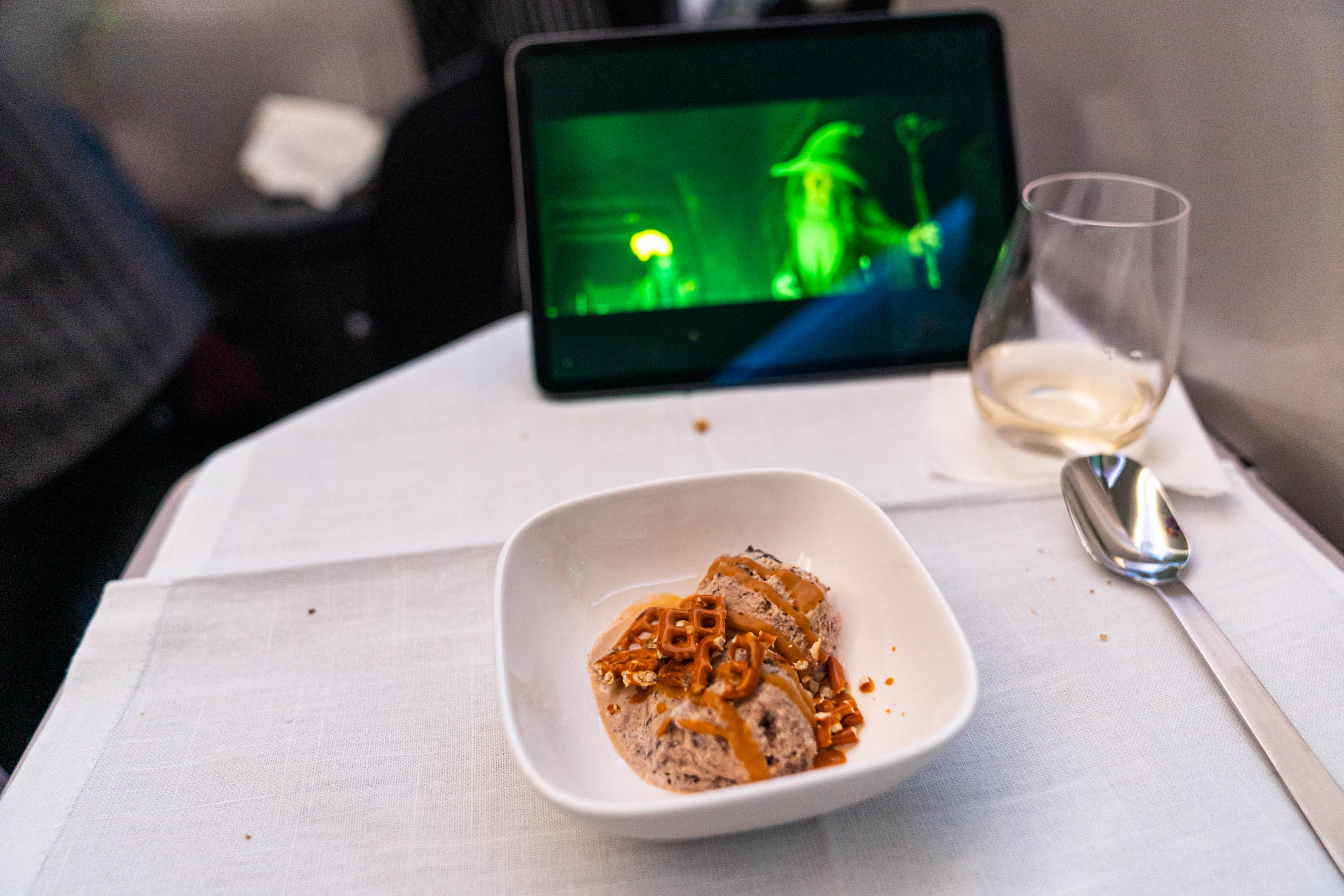
DAVID SLOTNICK/THE POINTS GUY
For dessert — another half-hour later — I went with the chocolate brownie ice cream. Often, ice cream on planes comes completely frozen and need some time to thaw, but the sundae was ready-to-eat. I suspect the flight attendants took it out to soften earlier in the meal service, which was a really nice touch.
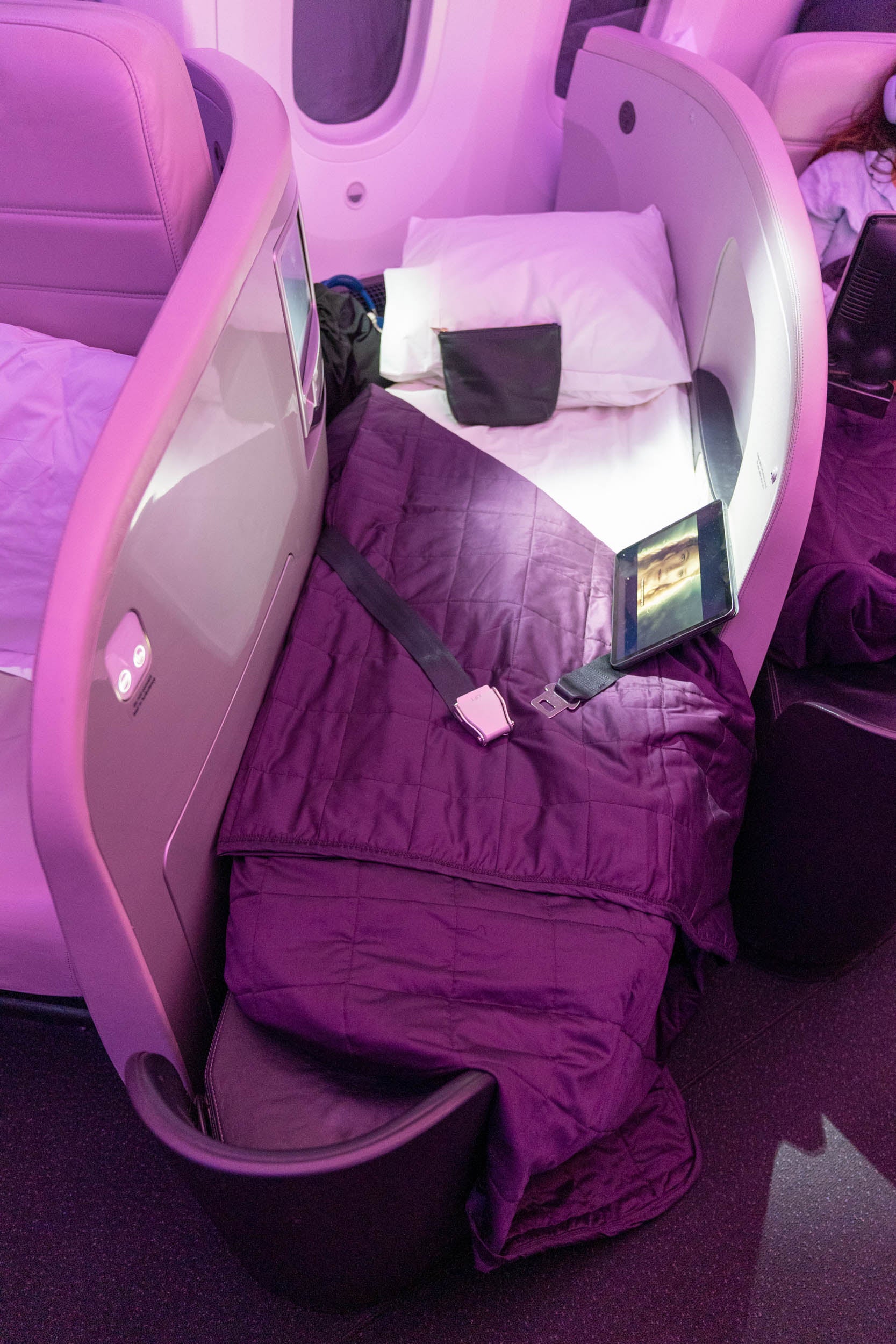
DAVID SLOTNICK/THE POINTS GUY
With my dessert finished, my table setting was cleared at two hours and 20 minutes after take-off. After doing some work and watching more of the Fellowship of the Ring, I asked a flight attendant to make up my bed about 40 minutes later — unlike newer business class products, passengers can’t make their own beds with these seats — and 25 minutes later, after the last scene of Fellowship, I went to sleep.
I woke up a few times during turbulence as we navigated around Tropical Storm Madeline off the west coast of Mexico, and a few other times because I was thirsty — I brought two liters of water on board with me, so I was well prepared. Those interruptions aside, I managed to sleep for seven hours. I’m not a great plane sleeper, even in business class, so that’s pretty remarkable for me.
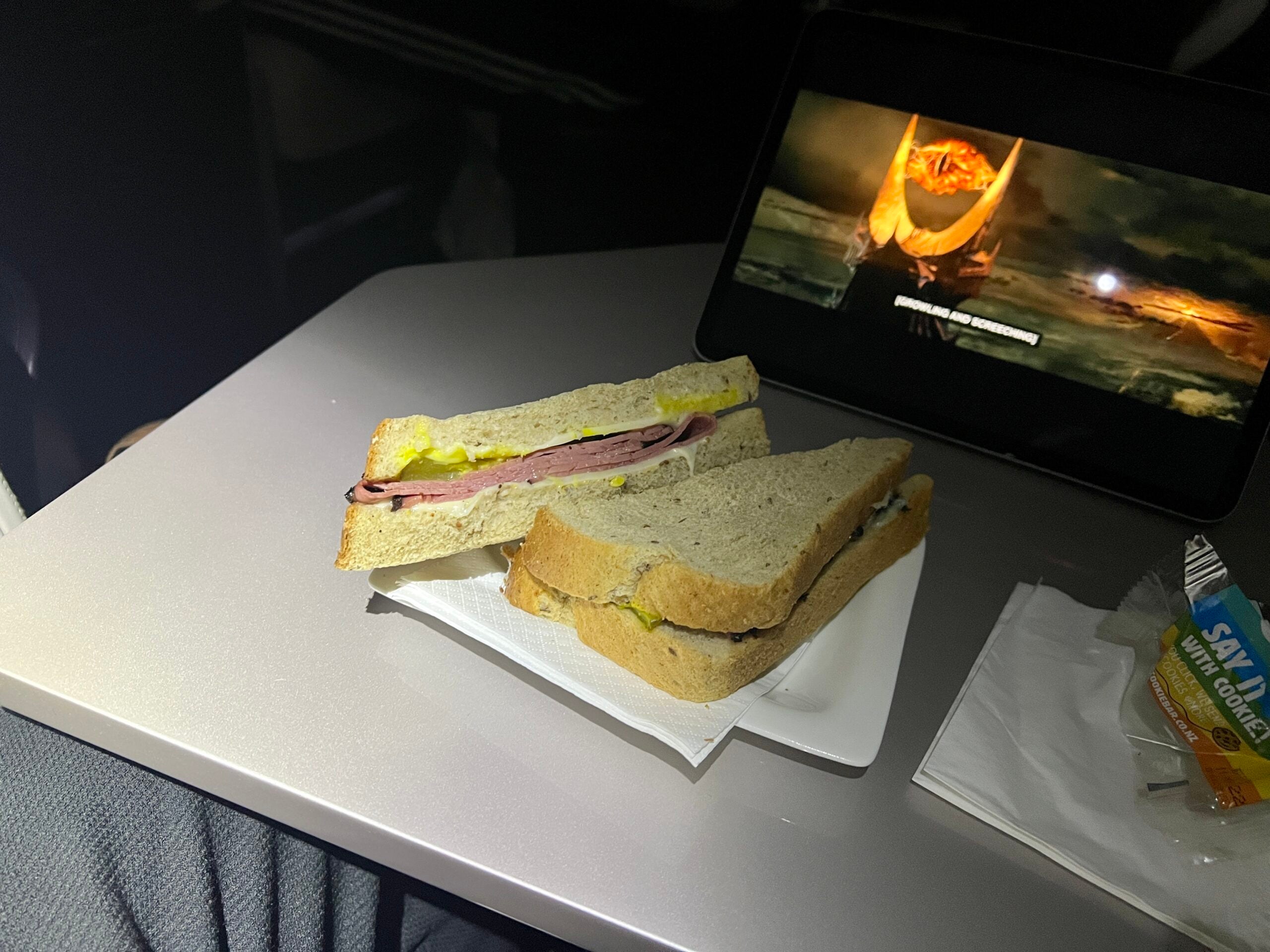
DAVID SLOTNICK/THE POINTS GUY
Still, at this point, we were only ten-and-a-half hours into the flight. A flight attendant helped convert my bed back into a chair, and I asked for a cup of coffee and the “Warm New York pastrami and Swiss cheese sandwich,” which was another hit. I also started the next movie in the trilogy, The Two Towers.
Over the next four hours, I did some work, drank more coffee, and watched more Lord of the Rings. By the time we’d been in the air for 14 hours, I was starting to feel the strain of a long flight. I was tired, despite the sleep; I had a headache; I felt sweaty and gross, and was tired of processed air. Even on a 787, which has a lower cabin elevation than older aircraft, it can start to feel draining after a while.
Still, I was happy to continue on for a few more hours rather than landing, disembarking, and then still having to fly those last thousand or so miles on another flight.
Fortunately, just after the 14 hour mark, the flight attendants began the pre-arrival service. It began with a warm towel, which was definitely a nice way to feel at least a little more refreshed.
A few minutes later, they came by with trays of juice — I chose the berry smoothie — and took breakfast orders.
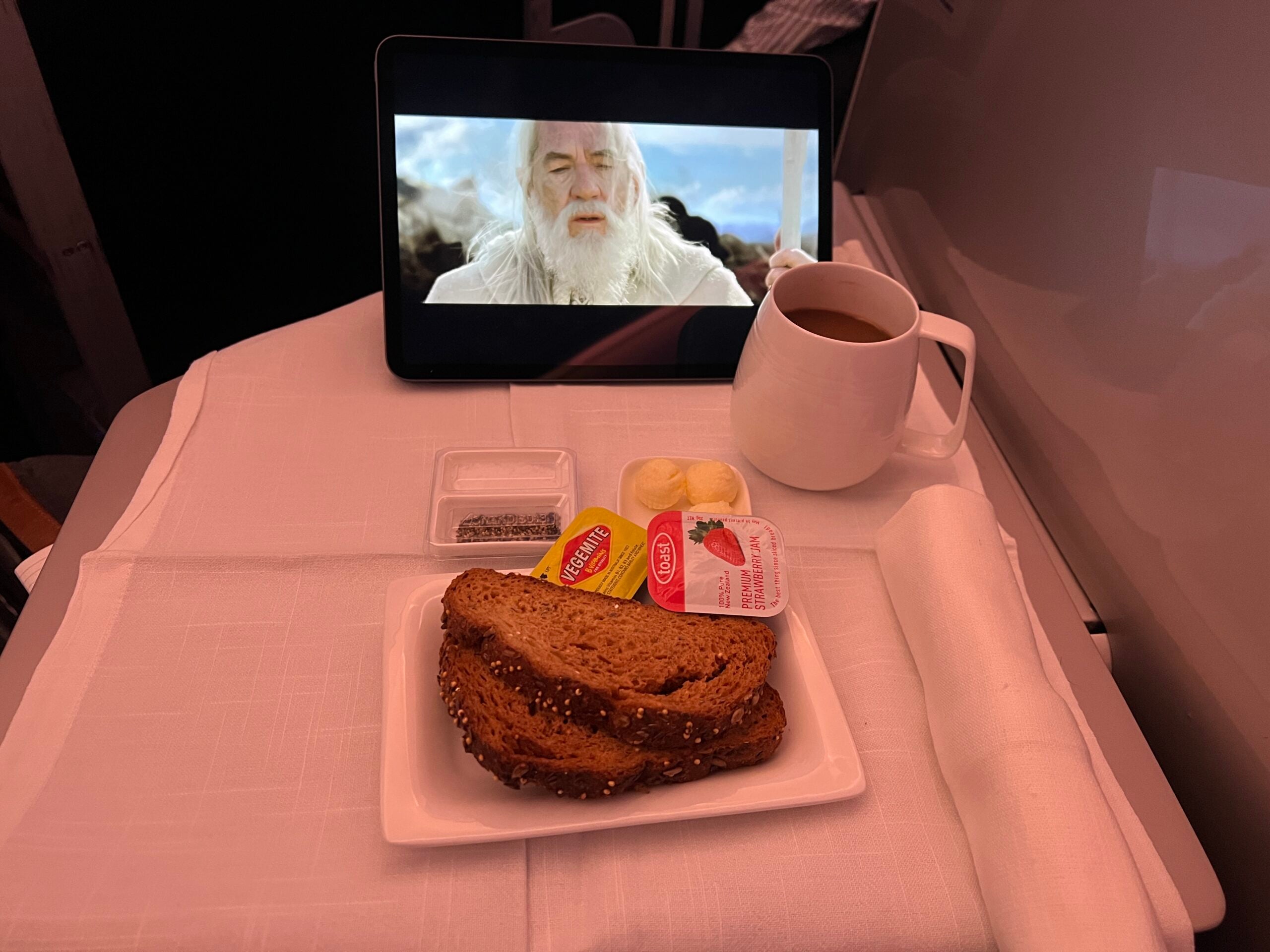
DAVID SLOTNICK/THE POINTS GUY
About 30 minutes later, the flight attendants offered a bakery basket as a “breakfast appetizer,” along with coffee or tea. This coincided with me finishing The Two Towers and starting the third movie, Return of the King.
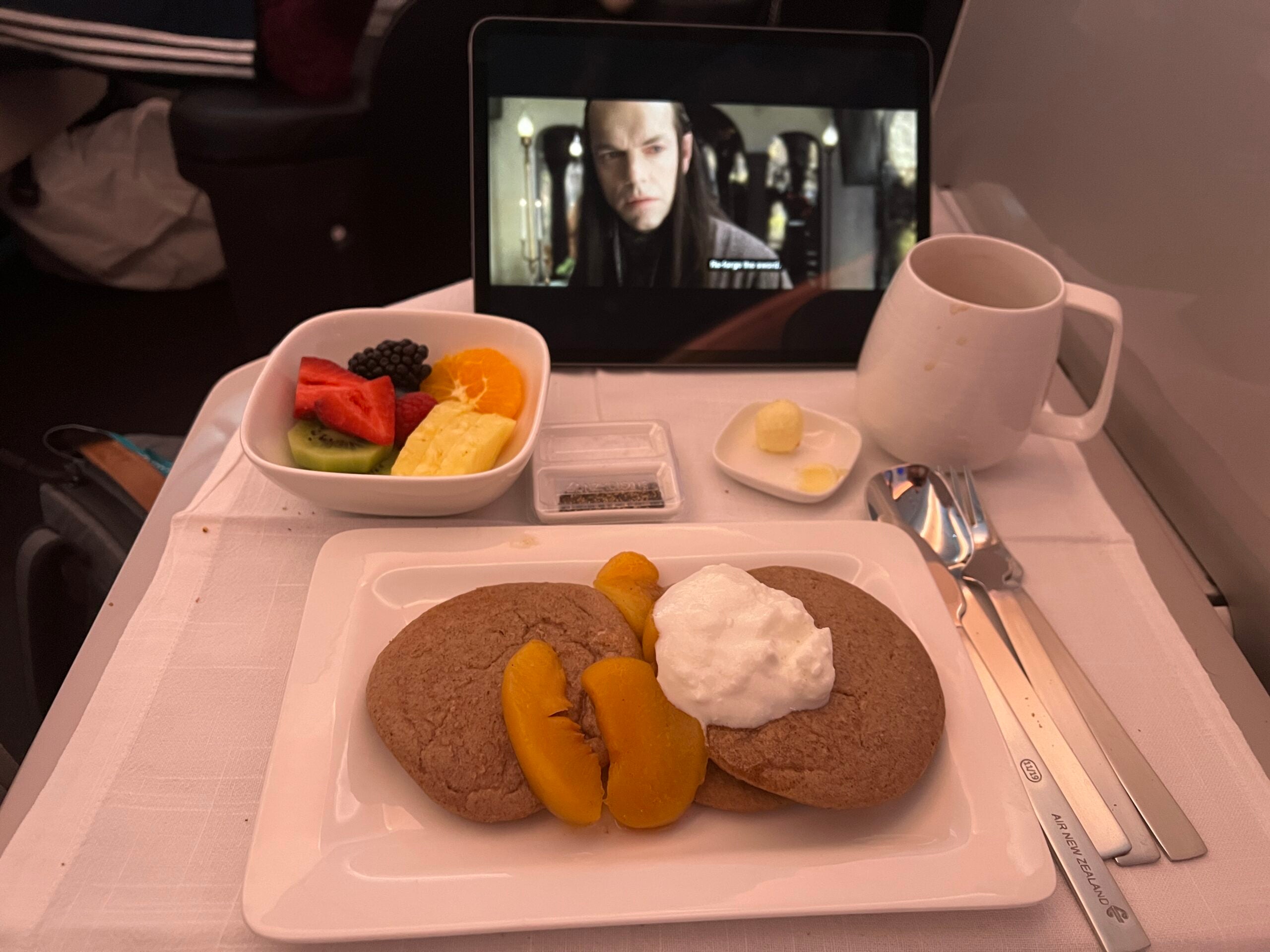
DAVID SLOTNICK/THE POINTS GUY
My breakfast order — the pancakes — came another 30 minutes later. They were good, although they could have used a sweet touch; they were missing the vanilla syrup.
By the time I finished, we had been in the air for 15 hours and 35 minutes. With just about an hour until landing, it was time to start packing up and getting ready.
After 16 hours and 36 minutes, we touched down in Auckland. I was definitely ready to get off of this plane.
menities — special and otherwiseAir New Zealand typically offers the standard amenity kits — toothbrush, eye mask, ear plugs, lotion, lip balm — in business class. For this flight, there were two celebratory upgrades with a local twist.
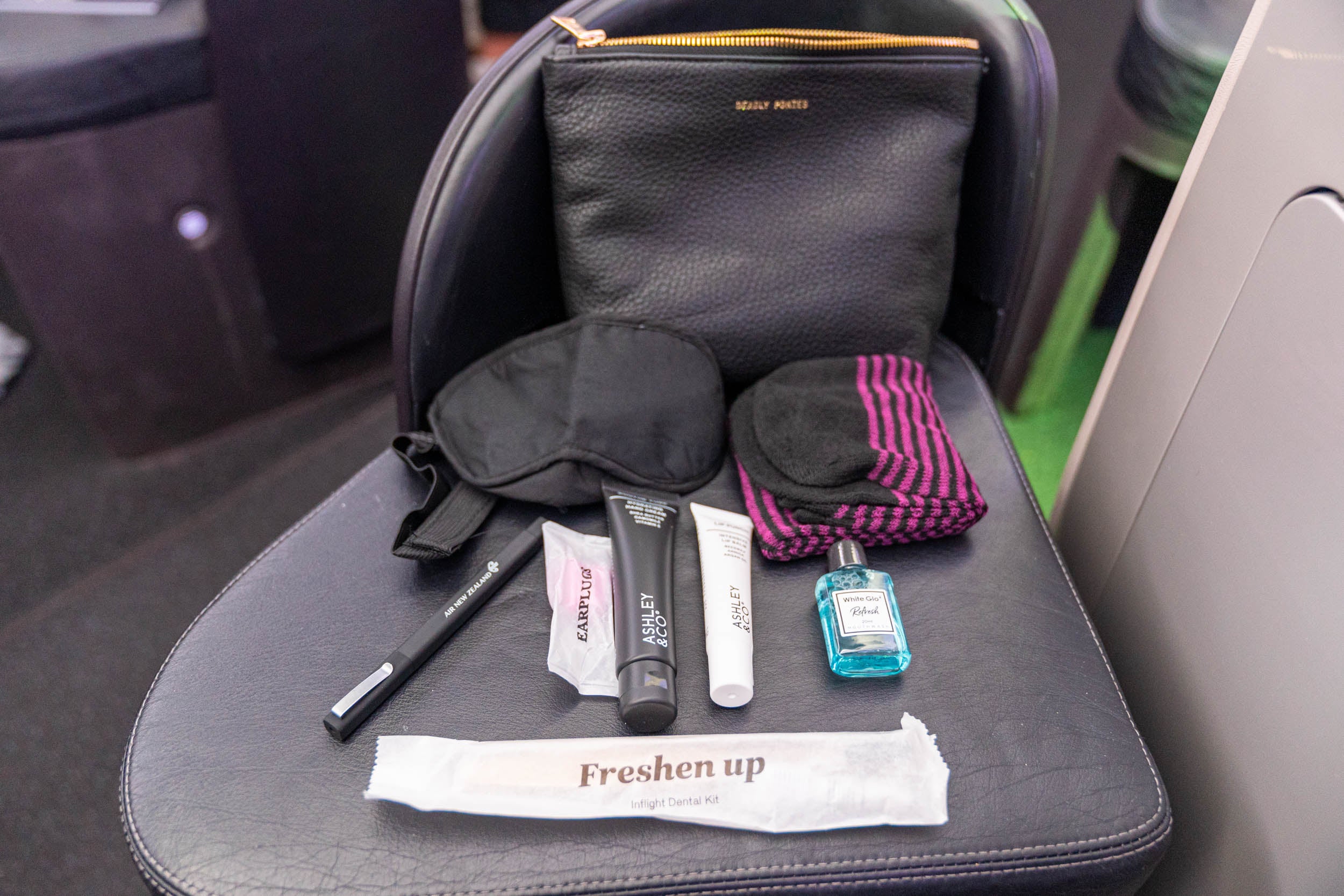
DAVID SLOTNICK/THE POINTS GUY
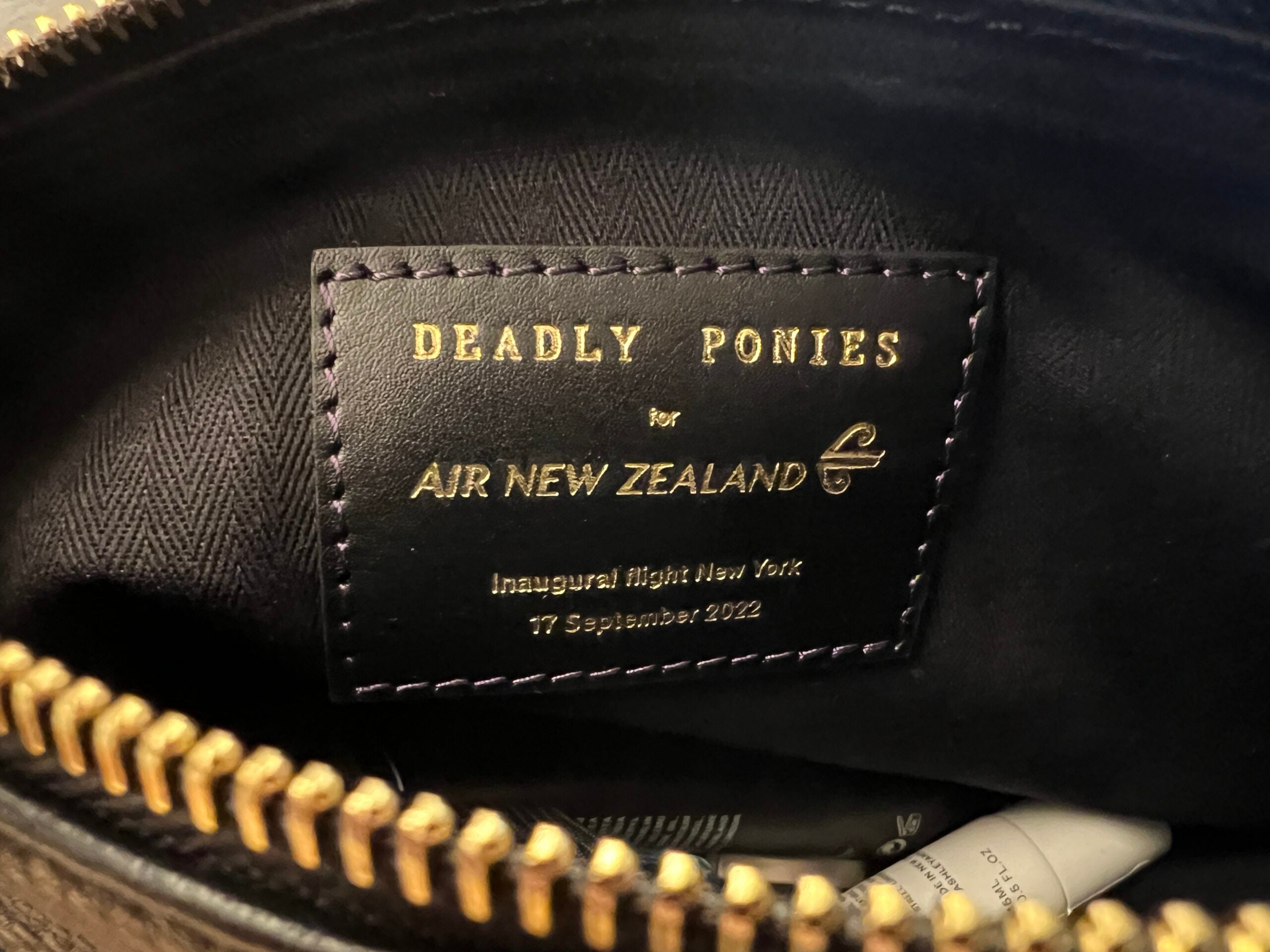
DAVID SLOTNICK/THE POINTS GUY
First, instead of the usual pouch, the airline teamed up with New Zealand designer Deadly Ponies to offer special edition leather bags, a sophisticated touch.
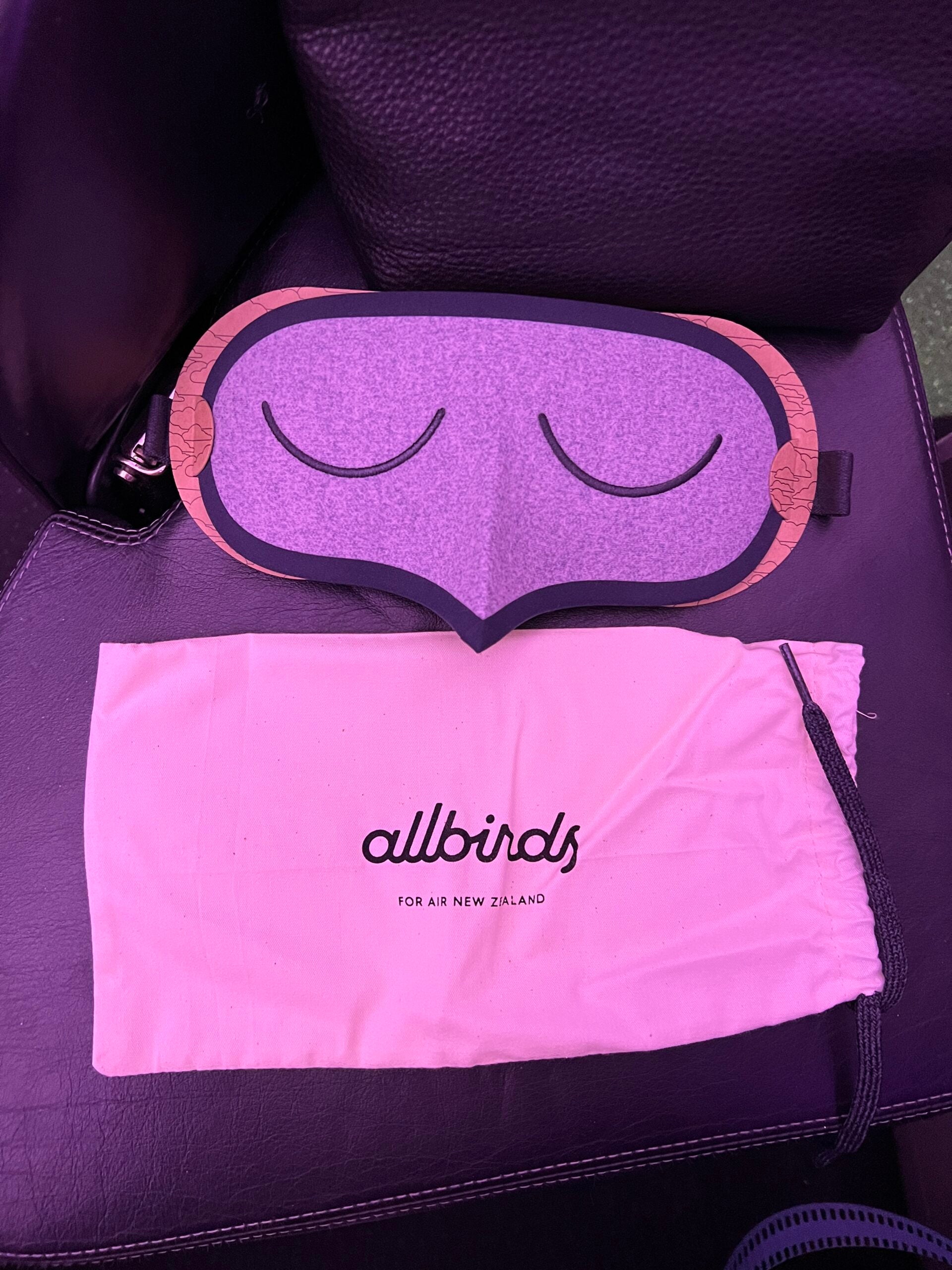
DAVID SLOTNICK/THE POINTS GUY
Second, the airline partnered with American sneaker-maker Allbirds, which is best known for making shoes out of wool sourced from New Zealand, to offer passengers a high-quality reusable sleep mask — also made of merino wool. These were at every seat on the plane, not just in business.
In addition, the media contingent got a sneak peek at a new product the airline is working to develop: business-class pajamas. A spokesperson for the airline said that these are still in the testing phase, but that the airline plans to introduce them in business class on all of its flights at some point in the future.
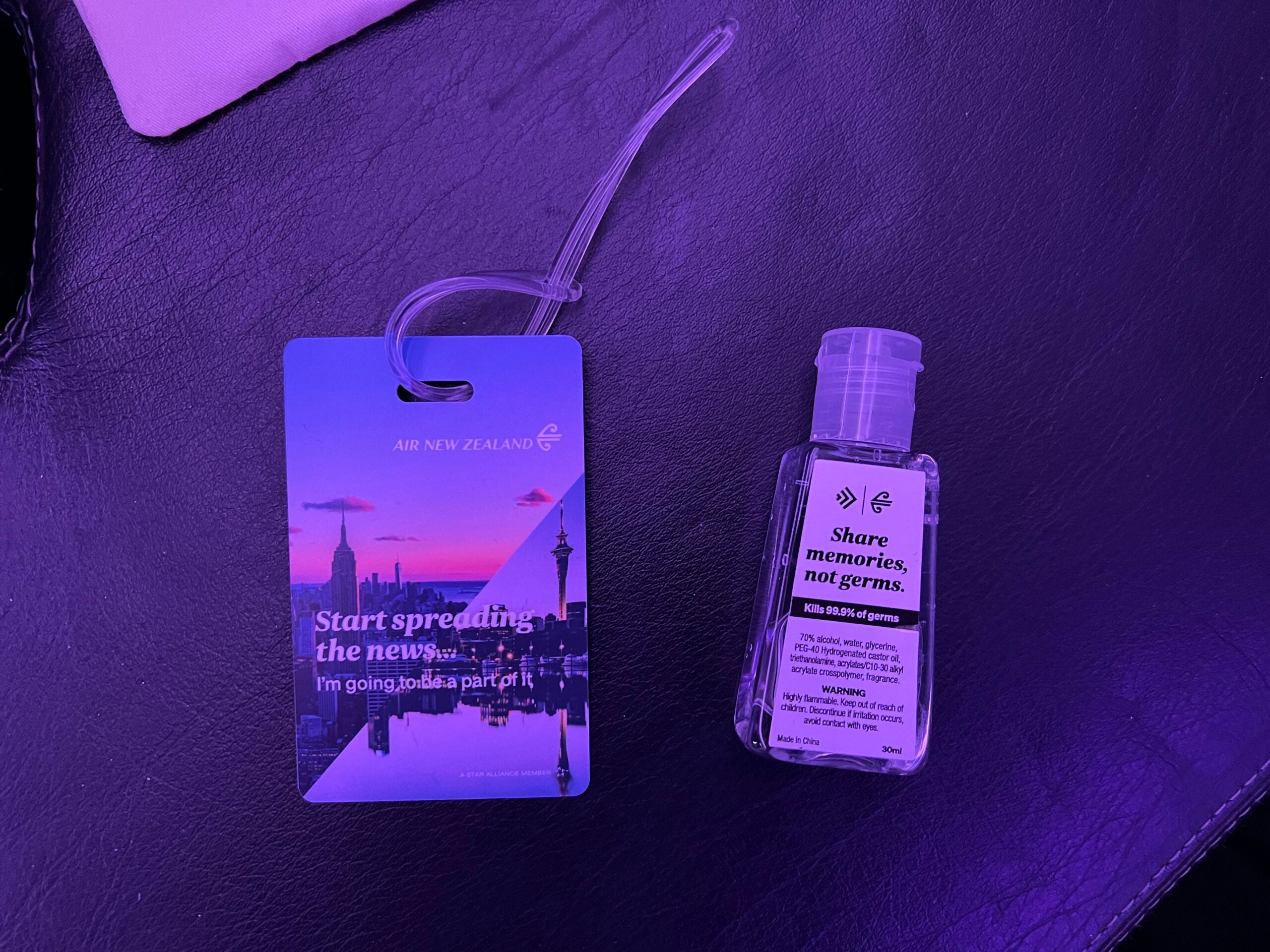
DAVID SLOTNICK/THE POINTS GUY
Finally, the airline gave out New York-themed luggage tags to everyone at check-in, along with a small bottle of hand sanitizer.
Final thoughts: A long flight
Even in business class, this flight felt long. And when you’re traveling to the other side of the world, that’s simply unavoidable. The question is whether you’d rather break the trip up with a few hours on the ground, or whether you’d rather power through.
When I flew back from Sydney after the Project Sunrise test flight in 2019, I sat in coach and connected in Los Angeles.
After about 10 hours on the first flight, I felt pretty awful. I was ready for the trip to be over. But we had a ways to go, I was settled in with my chargers plugged in and my movies queued up. Even though I can never sleep adequately when I’m sitting upright, I was dozing off for two or three minutes at a time — not enough to be restful, but enough to pass the time a little bit more quickly.
Then we landed in Los Angeles. It took two hours to make it through customs and security, to find the new gate, and buy a new bottle of water — the one I had left over from my first flight had to be sacrificed to the TSA.
By the time I got on the plane for my connecting flight, I felt twice as bad as I had before. The stretch on the ground didn’t do anything. Instead, it made me feel sweatier, more unsettled, less comfortable, and abjectly exhausted. The next five or six hours from Los Angeles to New York felt much worse than I had felt towards the end of the first flight, and by the time I landed at JFK and found a taxi home, I felt shattered. At the time, I’d wished we could have just continued straight through.
This flight was shorter and in business class, but it reaffirmed my view that it’s better to just get it over with, so to speak. I was ready to leave the plane, I felt kind of gross, but it was also over. I didn’t have to worry about making a connection, or repacking my bag, or any of that. Instead, I was able to go to my hotel, take a shower and a quick power nap, and start my day.
One important note, of course, is that moving around is essential, regardless of cabin. Making sure to shift position and walk around at least a few times during a flight this long goes a long way to not just feeling better and less stiff, but lowering the risk of blood clots developing.
Also be warned that while Air New Zealand is in the process of adding Wi-Fi to its entire fleet, not all aircraft have in-flight connectivity yet. My flight did, but it’s possible that you end up in the air for 17 hours without being able to connect.
Every cabin of this flight was just about full, and passengers aboard who I spoke with all said that they preferred the single ultra-long-haul to the usual stops in Houston, San Francisco or Los Angeles (it was unclear whether any of these passengers were among those whose luggage was left in New York, a gaffe from an otherwise-successful inaugural flight).
“Not having to connect is amazing,” Auckland-based passenger Hilary O’Connor told me. “You sleep for maybe 10 hours total, you wake up, and it doesn’t actually feel much longer than a Los Angles flight would have.”
“Even if I need to change my travel by a day or so, I would do that to be able to fly on the nonstop,” she added.
It all comes down to individual preference. But, personally, I agree.
Featured photo by David Slotnick/The Points Guy
Title: Onboard Air New Zealand’s inaugural flight from NYC to Auckland, the world’s 4th-longest
Sourced From: thepointsguy.com/news/air-new-zealand-jfk-on-board-review/
Published Date: Mon, 19 Sep 2022 12:30:01 +0000
No comments:
Post a Comment